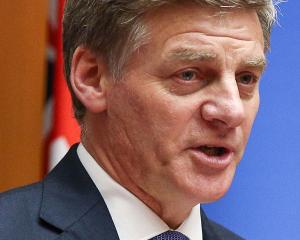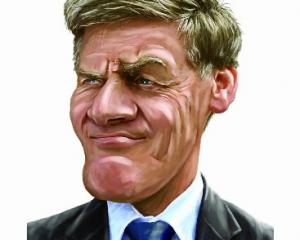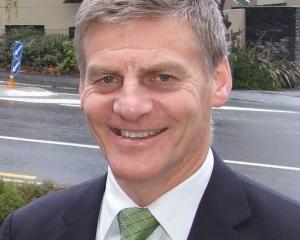David Cunliffe had been Labour leader for barely 24 hours before he was boldly declaring he had put his party on a ''war footing''.
So far, it has been a ''phony war footing''. There has been no shortage of bellicose statements emanating from Mr Cunliffe's corner over the past week as he has sought to exploit the multitude of media opportunities heaped on a new leader of a major party.
But the target of his invective - the minority National Government - has not played ball. Just as well perhaps. Mr Cunliffe already had his work cut out doing the necessary behind-the-scenes reorganisation of Labour's meagre resources so he can take what looks like being a pretty uncompromising, take-no-prisoners approach to Opposition politics. Labour became far too soft under David Shearer's leadership. Mr Cunliffe will fix that, if nothing else.
John Key's absence overseas has given Mr Cunliffe more valuable time to prepare for battle.
National has been pretending it is not that interested by the almost-overnight transformation of Labour's wing of Parliament from the almost-monastic atmosphere of the Shearer era to something far more corporate and, crucially, energised.
National's reaction is to project a business-as-usual front for public consumption. That was summed up by Gerry Brownlee's dismissal of Mr Cunliffe's victory last Sunday in the Labour leadership race as ''just another day; just another David''.
The phony war atmosphere was further accentuated by the much-touted first head-to-head clash in Parliament between the Prime Minister and the new Leader of the Opposition.
It was totally unrealistic to expect that after just two days in the job, Mr Cunliffe would immediately get the better of someone who has tormented Labour like no other National leader since Sir Robert Muldoon. Mr Brownlee and his colleagues are not so silly as to believe their own propaganda that nothing has changed.
National knows everything changed last Sunday - that its ''easy ride'', as Mr Cunliffe puts it, without mentioning the names of Mr Shearer and Phil Goff, is over.
One of the lesser-known reasons for Mr Key's success is his respect for his chief opponent - a respect which Labour has consistently failed to reciprocate, to its cost.
Mr Key will be assessing every move and utterance by Mr Cunliffe, while digesting every bit of data that can be dredged up by National's pollsters as voters shape their view of Labour's new leader.
Mr Key will put himself in Mr Cunliffe's position to try to second-guess what his new rival will do.
That will not be easy. Mr Cunliffe brings a different trait to the gladiatorial fight than his predecessors - unpredictability.
He can be brilliant. He can be dire. National likens him to the political equivalent of a Roman candle who, after shooting a series of spectacular balls of fire into the air, will fizzle out. That could happen anytime in the next 10 months.
It might not happen for another 10 years. It is impossible to tell. What is happening is that Mr Cunliffe is not so much the new broom sweeping through Labour's offices at Parliament, as someone water-blasting the last vestiges of the Shearer regime from Labour's edifice.
There are reports - vigorously denied by the Cunliffe camp - that staff are being probed on their loyalty to the new leader when reapplying for their old jobs.
Whether revenge will likewise be exacted on those MPs who made little secret of their animosity towards the New Lynn MP will become clear in Monday's reshuffle of shadow portfolios and caucus rankings.
Despite Mr Cunliffe's off-the-cuff claim that ''peace is breaking out all over the place'', it now seems his pledge to unify the deeply divided caucus did not extend to offering the post of deputy leader to Grant Robertson - his main rival for the party's top job.
It seems he always wanted the less threatening David Parker for that job. Perversely, that arrangement might suit everyone better, including Mr Robertson. Mr Robertson will instead chair a new House committee, which will include Labour's best attack-oriented MPs - the likes of Clayton Cosgrove and even Chris Hipkins, who went public with his criticism of Mr Cunliffe after the latter's abortive coup against Mr Shearer late last year.
While that committee will work out tactics to lift Labour's hit rate in Parliament, Mr Cunliffe will head a separate strategy committee to map out the parliamentary party's broader offensive against National.
Labour MPs issue countless press statements, the great majority of which are ignored. Rather than launching such unco-ordinated attacks on National ministers, Mr Cunliffe wants Labour's offensives to be linked to some theme that sticks in voters' minds.
The first example of that is the accusation that the Key Government is increasingly helping its big business backers in what amounts to ''crony capitalism'', be it a shonky tendering process for the construction of the new international-grade convention centre in Auckland or leaving the quota for the commercial fishery of snapper untouched, at the expense of those who fish for recreational reasons.
In order to portray Labour as a government-in-waiting, Mr Cunliffe will form a shadow Cabinet of 15 senior MPs, which will meet on Mondays - just like the real one - and consider various papers and documents flowing from Labour's tortuous policy formation process.
However, if Labour is to have any chance at next year's election, some major heavy lifting will have to be done by the new economic team of Mr Cunliffe, Mr Parker and Shane Jones, the other candidate for the leadership.
Labour's own polling is no different from any others - a clear majority of voters believe National is far better at running the economy than Labour. That cold, hard fact, plus the still phenomenal vote-pulling power of the Prime Minister, are the two basic things that stand between Labour and a return to the government benches.
John Armstrong is the political correspondent for The New Zealand Herald.




